Iran’s Quds Force Commander Vows Support For Hamas
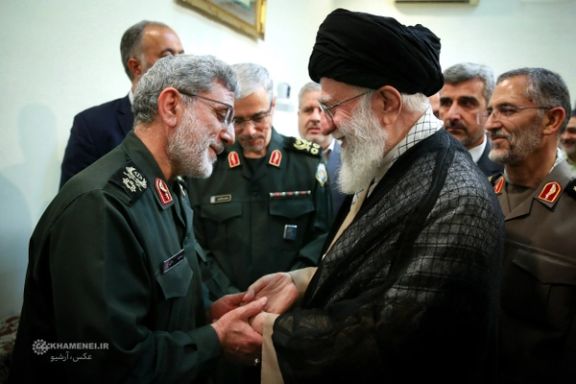
The commander of Iran's Revolutionary Guard extraterritorial Quds force says the ‘resistance front’ headed by Tehran supports Hamas militants in their conflict with Israel.

The commander of Iran's Revolutionary Guard extraterritorial Quds force says the ‘resistance front’ headed by Tehran supports Hamas militants in their conflict with Israel.
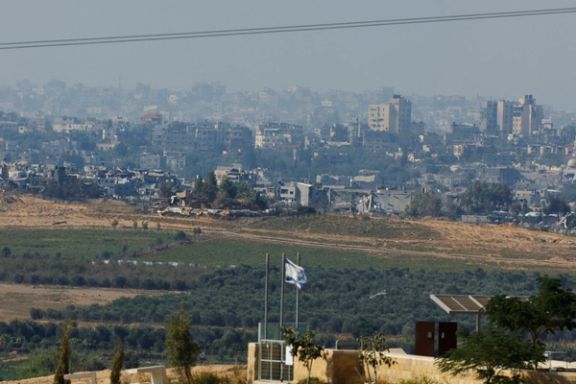
Iran International, the 24-hour news television channel broadcasting to Iran on satellite, was given entry into Gaza as the first Persian-language media.
The Israeli army permitted Iran International to visit Gaza and report on the developments of the Israel-Hamas war. The Israel Defense Forces (IDF) say that they have gained control over Gaza, but our correspondent heard sounds of gunfire, with Hamas forces said to be attacking from underground tunnels.
The Iran International news team entered Gaza in an Israeli military vehicle from the vicinity of a Kibbutz in southwestern Israel, which had witnessed the terror attack by Hamas on October 7th. This is the same route that Hamas militants used to enter the Kibbutz (Erez) and terrorize Israeli civilians.
Along the way, Israeli-plated vehicles, brought to Gaza by Hamas forces, can still be seen on the side of the road, the Iran International team reported. A black smoke covers the distance of Gaza city, and the sound of explosions continues incessantly.
An Israeli soldier told Iran International that although Gaza City is under the control of the army, the clearing operation is still ongoing, and sometimes Hamas militants open fire towards Israeli soldiers from their underground tunnels.
According to an Iran International correspondent, tens of thousands of residents from northern Gaza are moving towards the south of the Strip carrying white flags. Israeli forces are monitoring evacuations to prevent Hamas militants from stopping the process.
The report says that the extent of the war's devastation in northern Gaza is so severe that there is no place for life in this area, and it can be said that Gaza City has been destroyed.
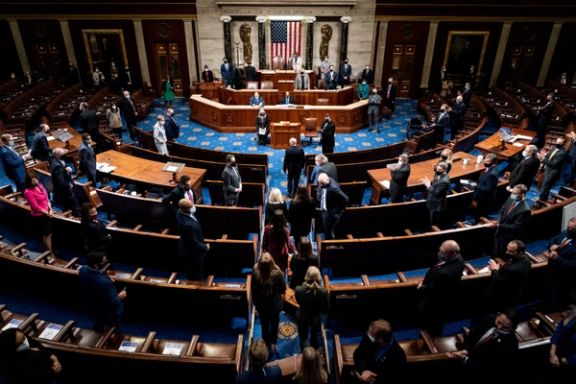
US lawmakers are introducing several measures to compel the Biden administration to adopt a more assertive stance towards Iran, including the possibility of a direct attack on Iranian soil.
Many in the Congress are dismayed by a new US sanction waiver that would see Iran gaining access to another $10 billion frozen in Iraq, while openly backing Hamas and celebrating its attack on Israel last month.
“We are in a day and age where we need to be aggressive with Iran,” Senator Joni Ernst told Iran International’s Arash Alaei. “If you look at what is going on in the Middle East right now, we see Iran sponsoring terrorism through Hezbollah, Hamas and the Palestinian Islamic Jihad.”
Senator Ernst is co-sponsoring a bill with Senator Richard Blumenthal that aims to enforce Iran’s oil sanctions –abandoned by the Biden administration in all but name.
The bipartisan bill includes a provision for a $150 million sanctions enforcement fund that would allow the Department of Homeland Security Investigations office to focus on enforcing Iranian oil sanctions.
“We need to start interdicting Iranian oil and use the funds for victims of state-sponsored terrorism”, Senator Ernst told Iran International.
Another initiative, introduced by Senators Lindsey Graham and Richard Blumenthal urges President Biden to attack Iran in case an American soldier was killed in Syria or Iraq.
“If an American is killed… then the target should be in Iran,” said Senator Graham at the press briefing introducing the initiative. “We’ve had four strikes, all inside Syria… Reagan hit Iran. Trump hit Iran… they need to pay a price they haven’t paid yet.”
And he explained the “price” in the clearest terms.
“That price should be the IRGC infrastructure… and the oil refineries should be knocked out if they continue their efforts to expand this war [between Israel and Hamas].”
Senators Graham and Blumenthal say that their draft is such that it would require no further Congressional authorization and President Joe Biden can take action at will.
“And the Iranians will get it,” Senator Blumenthal said at the same briefing. “And hopefully they’ll get it today, even before it’s passed, that we stand behind the President. We don’t want war. They shouldn’t want war.”
Iran and the US have been on a colliding course for a few weeks now, but so far have avoided direct conflict. The Islamic Republic utilizes its proxies in Iraq and Syria, as well as Houthis in Yemen and Hezbollah in Lebanon to attack US and Israeli targets. The United States, on the other hand, has retaliated by striking at IRGC affiliated facilities in Syria.
Senator Graham called for a direct and clear warning to be issued to Iran.
“So if you continue [the attacks], this is what’s coming your way,” he said, “we’re going to hit you hard in every sphere of influence, economic and military. We are on the edge right now. The Iranians can make some decision one way or the other. Choose wisely.”
Despite their persistence on shifting the Biden administration's approach towards Iran, the US lawmakers are not too optimistic about their chances.
Senator Ernst told Iran International that she felt Biden was not likely to enforce the bill even if it reached the final stage and was signed into law.
“I don't count much on the Biden administration,” she said, “I'm hopeful that in the next few years, we have a different leader that will be willing to enforce the sanctions.”
Many believe that the Biden administration has chosen to look the other way and allow Iran to export its oil in spite of the sanctions –hoping that in return, it would get the regime to agree to some kind of nuclear deal.
On Wednesday, a White House Energy Adviser Amos Hochstein said that the US will toughen up on Iran oil sanctions to curb the Islamic Republic’s revenues.
“We are going to enforce the sanctions,” he said, “those numbers will come down.”
Iran reportedly exported 1.4 million barrels of oil per day last month. This is almost twice as much as it averaged during Trump’s “maximum pressure” campaign, according to United Against Nuclear Iran.
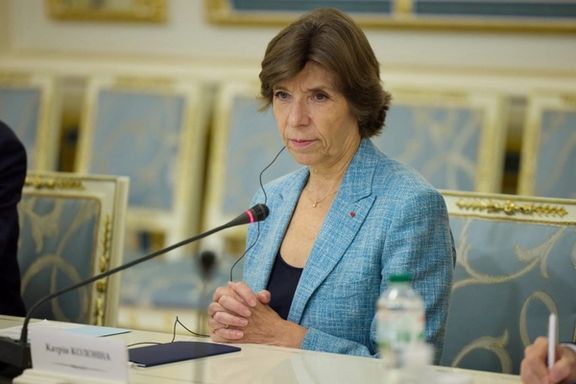
France's foreign minister said she had told her Iranian counterpart on Thursday that Tehran would bear a heavy responsibility if the conflict in Gaza spreads across the region.
"Meeting today with my Iranian counterpart in the form of a warning: the extension of the current conflict in Gaza would not benefit anyone, and Iran would have a heavy responsibility," Catherine Colonna said after a face-to-face meeting in Geneva with Hossein Amir-Abdollahian.
The conversation was the latest between French and Iranian officials as Paris looks in particular to defuse tensions between Israel and Iran-backed Hezbollah.
The United States has also reportedly asked Chinese President Xi Jinping to use his influence to persuade Iran not to engage in escalation. Iranian-backed militias in the region have launched more than 50 drone and rocket attacks against US troops stationed in Iraq and Syria since the October 7 attack on Israel. The US military has retaliated by launching three air strikes against Iran's Revolutionary Guard targets in eastern Syria.
Ties between France and Iran have also been strained in recent months over what Paris has said are arbitrary arrests of four of its citizens that it says are equivalent to state hostage taking.
"The minister finally called for the immediate release of the four French nationals still arbitrarily detained in Iran and whose situation is extremely worrying," the foreign ministry said in a separate readout of the meeting.
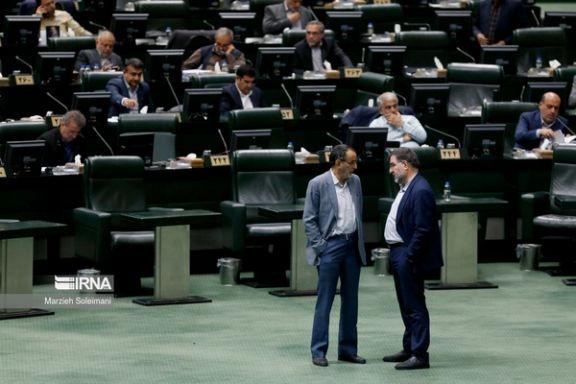
Concerns over a breach of Iranians’ privacy are growing as hardliners in the government defend a recent legislation to monitor peoples’ lifestyles online.
The controversial legislation, a clause of Article 75 of the Seventh Development Plan, mandates the Ministry of Islamic Guidance to launch a database consisting of information collected from online activities of individuals for "continuous monitoring and evaluation of cultural indicators, people’s lifestyles, media influence, and communications."
The legislation also requires government agencies and all domestic websites and platforms, including online businesses, to continuously feed their user information to the database.
Media and individuals on social media have extensively criticized the legislation that the parliament approved on November 8 but has yet to be endorsed by the constitutional watchdog, the Guardian Council.
Detractors, including legal experts, express concerns over the lack of assurance regarding the safety of individuals' sensitive personal information, despite a reference to Article 25 of the Iranian Constitution in the legislation. Article 25 explicitly prohibits the government from engaging in spying on citizens' private communications, “unless when required by law.”
Critics argue that this provision would empower any judge to override individuals' right to privacy whenever authorities, including security forces, decide to obtain private information and data derived from an individual's online activities across various platforms. This encompasses information related to travel and transportation, as well as online searches and downloads.
An earlier version of the proposed legislation explicitly outlined that the collected data would be utilized by authorities to "consolidate the Islamic-Iranian lifestyle," aiming to ensure that people's lifestyles align with the perceived Islamic standards of the regime.
In an interview with Ham-Mihan newspaper, Ali Yazdikhah, the deputy chairman of the parliament’s cultural committee, insisted that only "macro-data" would be stored in the database, emphasizing that it would not include information on individual citizens' lives and lifestyles. However, he acknowledged that data inputted into the system, such as individuals' interests or participation in religious ceremonies like Ashura, could be utilized to assess the general interest "in [Islamic] values and sanctities."
Several critics, including lawmaker Moeeneddin Saeedi, who opposes the bill, argue that the more the state engages in cultural engineering, the greater resistance it will encounter from the public. Saeedi stated, "Experience has proven that we have failed to advance indicators of culture with these [engineering] methods," he said during the debate on the parliament floor.

As an example, Saeedi pointed out that the current year's budget law stipulates that mosques conducting prayer congregations twice daily should receive financial incentives. However, he contended that the effectiveness of such measures in encouraging regular prayer is questionable, as over 75 percent of mosques in the country remain inactive due to insufficient attendance, despite the authorities' efforts to revitalize them.
Renowned journalist and social researcher Abbas Abdi told Ham-Mihan newspaper that the gathering of data for social research, if indeed the intended purpose of launching a database, is not inherently new or objectionable. However, he argued that government agencies lack the competence to carry out reliable research projects, and they are neither genuinely interested in nor adequately prepared to discover people's preferences or to publish research results to public.
He highlighted that authorities routinely withhold statistics on sensitive topics, including relationships between men and women, alcohol consumption, addiction, birth rates, age of marriage, and suicide.
“Suppose that they conduct research [based on the data available in the database] about dress code [=hijab], … They can’t publish the results because they are afraid people’s views and beliefs [will be known],” he said.
“However, if they intend to monitor people’s private lives and gather personal information, this would only be for the purpose of controlling and intimidating the public,” he added.
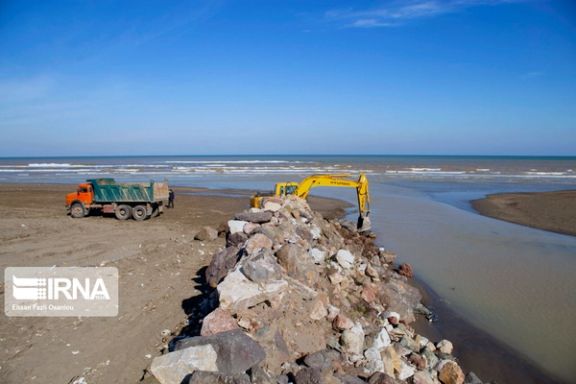
Ahmad Tavakoli, the head of the Civil Coordination in Mazandaran Province, has warned about a significant decline in the Caspian Sea water level, dropping by about four meters since the 1970s.
Tavakoli attributed the change in the world's largest lake to “substantial precipitation and the annual water flow", Iran recently blaming Russia for the crisis, emphasizing the closure of vital entrances, especially the Volga River.
Ali Salajegheh, the head of the Iranian Department of Environment, said the ecological challenge posed by the situation reveals a reduction of approximately one meter over the past 4-5 years, with an average annual recession of 20 centimeters.
His rare criticism against Russia, one of Iran's strongest allies, raised concerns about the ecological impact of dams constructed on the Volga River and the potential damage to delicate ecosystems relying on the Caspian Sea's waters
According to the Central Asia-Caucasus Analyst, it says: "This will have significant and serious implications, including a decline of the sea water level, a considerable retreat of the sea and increase of the land and coastal area especially in upstream countries (Russia and Kazakhstan), challenges to the operation of ports and shipping, as well as environmental consequences, particularly the drying of protected areas and wetlands."
It warned that the water level of the Caspian Sea has decreased by one meter in recent years and could drop by 9 to 18 meters by the end of the 21st century.
“In support of the Axis of Resistance, we will undertake all necessary measures during this historic battle.” Esmail Qaani told the commanders of the Tehran-backed groups on Thursday, Iran's semi-official Tasnim news agency reported.
"Resistance Axis" refers to an alliance of Iran-backed armed groups in the Middle East controlled by the Quds Force, that oversees financial and military support to Tehran’s proxies in Iraq, Syria, Lebanon, Yemen and elsewhere.
It appears that while Iran's leadership and diplomatic apparatus attempt to maintain a distance from the ongoing war, hardliners such as IRGC commanders continue to push the boundaries.
Supreme Leader Ali Khamenei has publicly endorsed Hamas ideology to destroy Israel and has made statements that can be interpreted as signals to proxy groups in the region, to attack Israeli ships and other targets, while rejecting any responsibility for such attacks. The same tactic has been used regarding attacks on US forces in the region.
Additionally, the Iranian Foreign Minister, Hossein Amir-Abdollahian, addressed the ongoing conflict between Israel and Hamas during an interview with CBS on Wednesday, stating, "We did not want this crisis to escalate."
The ongoing war began with Hamas fighters rampaging into Israel on October 7, killing more than 1,200 people and taking at least 240 hostages.
The United States has also warned Iran not to escalate the conflict in the region.
As reported by Reuters, US President Joe Xi Jinping on Wednesday to dissuade Iran from taking provocative steps that might aggravate the war.